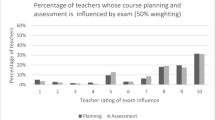Abstract
We study the causal effect of state-mandated (central) exit examinations (CEEs) on student performance in Germany and find a small positive effect. We also investigate what actually drives this effect. We find that the teachers’ main reaction to CEEs is to increase the amount of homework and to check and discuss homework more often. Students report increased learning pressure, which has sizeable negative effects on student attitudes toward learning. Students who take central exit exams in mathematics like mathematics less, think it is less easy, and are more likely to find it boring.


Similar content being viewed by others
Notes
A fourth type of track, the comprehensive school, does not appear in our figures. This type offers all lower secondary level leaving certificates, as well as providing upper secondary education. It only plays a minor role in most federal states with less than 10% of all students in grade 8 attending a comprehensive school.
As mentioned in Section 1, CEEs have now been introduced in Saarland (2001), Hamburg (2005), Brandenburg (2005), Hesse (2006), Lower Saxony (2006), Berlin (2007), North Rhine-Westphalia (2007), Bremen (2007), and Schleswig-Holstein (2008).
As has been pointed out by one referee, Saxony would make good comparison state to corroborate our results if students in Saxony (passing central exams in mathematics and science) are compared to those with CEEs only in mathematics. The main problem with this strategy is that the number of independent observations (classes, not students) in Saxony is very low (12). However, there is evidence that, in Saxony, biology homework is taken more seriously relative to mathematics homework than in other CEE states, which supports our hypothesis.
In Bavaria, between 25% (intermediate track) and 40% (basic track) of the students take the CEEs in science.
References
Bishop JH (1997) The effect of national standards and curriculum-based exams on achievement. Am Econ Rev 87(2):260–264
Bishop JH (1999) Are national exit examinations important for educational efficiency? Swed Econ Policy Rev 6(2):349–401
Costrell RM (1997) Can educational standards raise welfare? J Public Econ 65(3):271–293
Effinger MR, Polborn MK (1999) A model of vertically differentiated education. J Econ 69(1):53–69
Frenck I (2001) Stundentafeln der Primar- und Sekundarstufe I im Ländervergleich-eine empirische Studie am Beispiel der Fächer Deutsch und Mathematik. Unpublished master thesis, University of Essen
Hanushek EA (1996) School resources and student performance. In: Burtless G (ed) Does money matter? The effect of school resources on student achievement and adult success. Brookings Institution, Washington, DC, pp 43–73
Holland PW (1986) Statistics and causal inference. J Am Stat Assoc 81(396):945–960
Hoxby CM (2000) The effects of class size on student achievement: new evidence from population variation. Q J Econ 115(4):1239–1285
IEA TIMSS (1998) TIMSS science items: released set for population 2 (seventh and eighth grades). Available at http://timss.bc.edu/timss1/timsspdf/bsitems.pdf. Accessed 1 March 2002
Jonen G, Eckardt T (2006) The education system in the Federal Republic of Germany 2004. Secretariat of the Standing Conference of the Ministers of Education (KMK). Available at http://www.kmk.org/dossier/dossier_en_ebook.pdf. Accessed 12 Jan 2007
Jürges H, Schneider K (2007) What can go wrong will go wrong: birthday effects and early tracking in the German school system. MEA Discussion Paper 138-07, University of Mannheim
Jürges H, Richter WF, Schneider K (2005a) Teacher quality and incentives, theoretical and empirical effects of standards on teacher quality. Finanzarchiv 61(3):298–326
Jürges H, Schneider K, Büchel F (2005b) The effect of central exit examinations on student achievement: quasi-experimental evidence from TIMSS Germany. J Eur Econ Assoc 3(5):1134–1155
Kultusministerkonferenz (ed) (2005) Bildungsstandards der Kultusministerkonferenz Erläuterungen zur Konzeption und Entwicklung. Luchterhand, München/Neuwied
Acknowledgements
We are grateful to Helen Ladd and two anonymous referees for their helpful comments.
Author information
Authors and Affiliations
Corresponding author
Additional information
Responsible editor: Christian Dustmann
Appendix
Appendix
Rights and permissions
About this article
Cite this article
Jürges, H., Schneider, K. Central exit examinations increase performance... but take the fun out of mathematics. J Popul Econ 23, 497–517 (2010). https://doi.org/10.1007/s00148-008-0234-3
Received:
Accepted:
Published:
Issue Date:
DOI: https://doi.org/10.1007/s00148-008-0234-3




